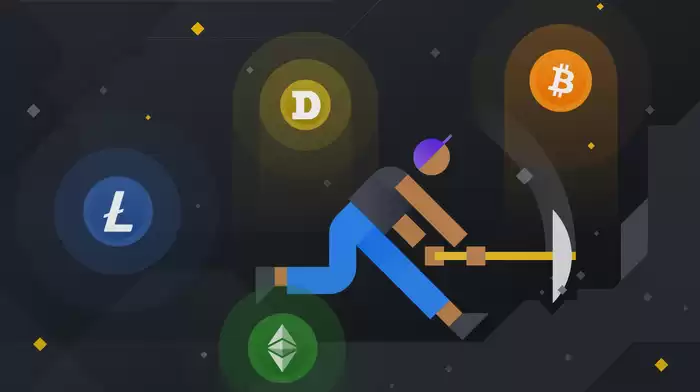-
 bitcoin
bitcoin $87959.907984 USD
1.34% -
 ethereum
ethereum $2920.497338 USD
3.04% -
 tether
tether $0.999775 USD
0.00% -
 xrp
xrp $2.237324 USD
8.12% -
 bnb
bnb $860.243768 USD
0.90% -
 solana
solana $138.089498 USD
5.43% -
 usd-coin
usd-coin $0.999807 USD
0.01% -
 tron
tron $0.272801 USD
-1.53% -
 dogecoin
dogecoin $0.150904 USD
2.96% -
 cardano
cardano $0.421635 USD
1.97% -
 hyperliquid
hyperliquid $32.152445 USD
2.23% -
 bitcoin-cash
bitcoin-cash $533.301069 USD
-1.94% -
 chainlink
chainlink $12.953417 USD
2.68% -
 unus-sed-leo
unus-sed-leo $9.535951 USD
0.73% -
 zcash
zcash $521.483386 USD
-2.87%
What does blockchain mining mean?
Blockchain mining utilizes specialized computers to verify transactions, secure the blockchain network, and create new cryptocurrencies through solving complex mathematical equations (PoW).
Oct 01, 2024 at 05:00 am

Blockchain mining is the process of verifying and adding transaction records to a blockchain, a decentralized and secure digital ledger. Miners use specialized computers to solve complex mathematical equations, known as proof-of-work (PoW), to secure the network and create new cryptocurrencies.
2. Process- Transaction Verification: Miners gather unverified transactions and bundle them into blocks. They check each transaction for validity by ensuring the sender has enough funds and the recipient's address is valid.
- PoW Algorithm: Miners attempt to solve the PoW algorithm by guessing a random number, the 'nonce'. When the nonce is found, it produces a hash that meets specific criteria. This verifies the transactions and adds the block to the chain.
- Broadcast and Acceptance: The verified block is broadcast to the network, and other nodes check its validity. If accepted, it becomes part of the permanent blockchain record.
- Network Security: Mining strengthens the blockchain by verifying transactions and preventing fraudulent activities.
- Cryptocurrency Creation: The PoW process creates new cryptocurrencies, such as Bitcoin, as a reward to miners.
- Decentralization: Miners are independent actors, which helps prevent a single entity from controlling the network.
- Individual Mining: Individuals use their own computers to mine, but the chances of finding a block are very low.
- Pool Mining: Miners join a collective group to increase their chances of earning rewards.
- Cloud Mining: Individuals rent computing power from cloud services to mine without owning specialized equipment.
Blockchain mining consumes significant energy, sparking environmental concerns. However, alternative mining protocols, such as proof-of-stake (PoS), are emerging to reduce energy consumption.
Disclaimer:info@kdj.com
The information provided is not trading advice. kdj.com does not assume any responsibility for any investments made based on the information provided in this article. Cryptocurrencies are highly volatile and it is highly recommended that you invest with caution after thorough research!
If you believe that the content used on this website infringes your copyright, please contact us immediately (info@kdj.com) and we will delete it promptly.
- Ray Dalio Sounds the Alarm on CBDCs, Financial Privacy, and the Shifting Power Balance
- 2026-02-11 10:30:01
- Coin Community Bids Farewell to Bill Dimitropoulos, Marking a Profound Loss
- 2026-02-11 06:50:02
- LayerZero Unveils 'Zero' Blockchain, Fueling L1 Interoperability with Institutional Backing
- 2026-02-11 07:10:01
- New Mexico's Route 66 Centennial Coin Rolls Out a Milestone Celebration
- 2026-02-11 07:05:01
- Baxter's Bold Move: Token Dividend Puts Turnaround Credibility on the Line
- 2026-02-11 07:15:01
- Analysis Finds No Direct Information on Tokenized Real Estate, Dubai, or Expatriate Investors in Provided Text
- 2026-02-11 07:25:01
Related knowledge

How to verify your mining payouts on the blockchain?
Feb 10,2026 at 10:39am
Understanding Blockchain Transaction Verification1. Every mining payout is recorded as a transaction on the blockchain, visible to anyone with access ...

How to mine Dash with an X11 ASIC miner?
Feb 10,2026 at 07:20pm
Understanding Dash Mining Mechanics1. Dash operates on a proof-of-work consensus algorithm named X11, which chains eleven distinct cryptographic hash ...

How to mine Grin using the Cuckatoo32 algorithm?
Feb 09,2026 at 05:20pm
Understanding Cuckatoo32 Algorithm Fundamentals1. Cuckatoo32 is a memory-hard proof-of-work algorithm designed specifically for Grin’s MimbleWimble pr...

How to set up a Helium miner for passive income?
Feb 10,2026 at 07:19am
Understanding Helium Network Mechanics1. The Helium network operates as a decentralized wireless infrastructure powered by LoRaWAN and CBRS protocols,...

How to mine crypto sustainably in 2026?
Feb 07,2026 at 04:20pm
Energy Source Optimization1. Miners increasingly deploy solar arrays directly on warehouse rooftops to power ASIC rigs during daylight hours. 2. Geoth...

How to increase the hash rate on a Bitcoin miner?
Feb 09,2026 at 08:19am
Optimizing Hardware Configuration1. Ensure all ASIC chips are fully powered and operating within their specified voltage range. Undervolting below the...

How to verify your mining payouts on the blockchain?
Feb 10,2026 at 10:39am
Understanding Blockchain Transaction Verification1. Every mining payout is recorded as a transaction on the blockchain, visible to anyone with access ...

How to mine Dash with an X11 ASIC miner?
Feb 10,2026 at 07:20pm
Understanding Dash Mining Mechanics1. Dash operates on a proof-of-work consensus algorithm named X11, which chains eleven distinct cryptographic hash ...

How to mine Grin using the Cuckatoo32 algorithm?
Feb 09,2026 at 05:20pm
Understanding Cuckatoo32 Algorithm Fundamentals1. Cuckatoo32 is a memory-hard proof-of-work algorithm designed specifically for Grin’s MimbleWimble pr...

How to set up a Helium miner for passive income?
Feb 10,2026 at 07:19am
Understanding Helium Network Mechanics1. The Helium network operates as a decentralized wireless infrastructure powered by LoRaWAN and CBRS protocols,...

How to mine crypto sustainably in 2026?
Feb 07,2026 at 04:20pm
Energy Source Optimization1. Miners increasingly deploy solar arrays directly on warehouse rooftops to power ASIC rigs during daylight hours. 2. Geoth...

How to increase the hash rate on a Bitcoin miner?
Feb 09,2026 at 08:19am
Optimizing Hardware Configuration1. Ensure all ASIC chips are fully powered and operating within their specified voltage range. Undervolting below the...
See all articles










































































